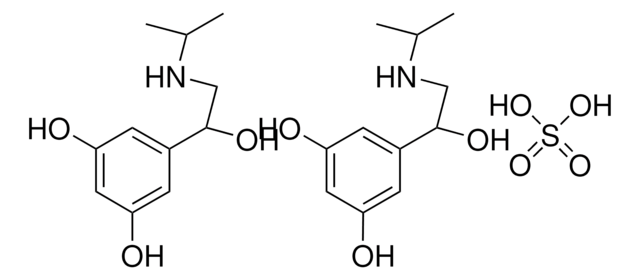P1290000
Phenytoin
European Pharmacopoeia (EP) Reference Standard
Sinónimos:
5,5-Diphenylhydantoin, 5,5-Diphenyl-2,4-imidazolidinedione, Phenytoin
About This Item
Productos recomendados
grade
pharmaceutical primary standard
API family
phenytoin
manufacturer/tradename
EDQM
technique(s)
HPLC: suitable
gas chromatography (GC): suitable
mp
293-295 °C (lit.)
application(s)
pharmaceutical (small molecule)
format
neat
SMILES string
O=C1NC(=O)C(N1)(c2ccccc2)c3ccccc3
InChI
1S/C15H12N2O2/c18-13-15(17-14(19)16-13,11-7-3-1-4-8-11)12-9-5-2-6-10-12/h1-10H,(H2,16,17,18,19)
InChI key
CXOFVDLJLONNDW-UHFFFAOYSA-N
Gene Information
human ... SCN10A(6336) , SCN11A(11280) , SCN1A(6323) , SCN2A(6326) , SCN3A(6328) , SCN4A(6329) , SCN5A(6331) , SCN7A(6332) , SCN8A(6334) , SCN9A(6335)
¿Está buscando productos similares? Visita Guía de comparación de productos
General description
Application
Biochem/physiol Actions
Packaging
Other Notes
related product
signalword
Danger
hcodes
Hazard Classifications
Acute Tox. 4 Oral - Carc. 2 - Repr. 1B
Storage Class
6.1C - Combustible acute toxic Cat.3 / toxic compounds or compounds which causing chronic effects
wgk_germany
WGK 3
Elija entre una de las versiones más recientes:
Certificados de análisis (COA)
Lo sentimos, en este momento no disponemos de COAs para este producto en línea.
Si necesita más asistencia, póngase en contacto con Atención al cliente
¿Ya tiene este producto?
Encuentre la documentación para los productos que ha comprado recientemente en la Biblioteca de documentos.
Los clientes también vieron
Nuestro equipo de científicos tiene experiencia en todas las áreas de investigación: Ciencias de la vida, Ciencia de los materiales, Síntesis química, Cromatografía, Analítica y muchas otras.
Póngase en contacto con el Servicio técnico










